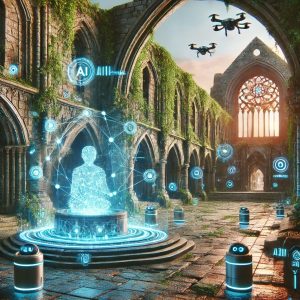While physical innovations are a major aspect of the fourth industrial revolution, others are purely digital. One of these is known as the internet of things, or IoT.
The IoT is a core concept that brings together physical and digital applications. It describes a network between physical devices – be they smartphones or home appliances – and the people who use them. Constructing such a network is possible thanks to advances in technologies like transmitters and sensors. For example, these days packages in the post are often equipped with a sensor, a transmitter or some other radio frequency identification equipment, enabling us to follow their progress as they make their way to us.
Uber and Airbnb present other examples. Through digital platforms, these businesses connect physical objects, namely cars and houses, with the people who need them.
And, finally, in the fourth industrial revolution, there are a range of biological trends and innovations around things like genetics. Genetic engineering, in particular, will have a tremendous impact on humanity. For instance, compared to the Human Genome Project, which lasted for ten years and cost billions, a genome today can be sequenced within hours for less than a thousand dollars. We owe this progress to increased computing power. Contemporary scientists can use models to test genetic variations, evaluating them much more quickly than through the previous method of trial and error.
In fact, science may soon be capable of precision medicine. That is, scientists could do things like decode the genetic composition of a tumor and offer a treatment that’s tailored to that specific case of cancer.
And that’s not all genetic innovation could enable. It will also allow us to design plants, animals and even babies with the characteristics we desire. Such technological applications are no longer the stuff of science fiction. While such interventions, of course, pose ethical and regulatory considerations, the technology to make them happen has either already been developed or soon will be.
The fourth industrial revolution is clearly a powerful engine of progress and growth. But how will it impact the world around us?
There are several areas that will be affected in particular, and the first is the economy. More precisely, this industrial revolution will likely have a significant positive impact on the global economy, simply by spurring economic growth. While pessimists might argue that we’re still living out the recession of the 2008 financial crisis, we’re really in the midst of a massive economic upswing brought on by the fourth industrial revolution. And this process of technological growth is only beginning; with time, it will translate into real economic growth.
For instance, advanced technologies and digitization are making it cheaper to invest in renewable energy, energy storage and more efficient fuels. This will make investment much more profitable, which means companies won’t have to rely on government subsidies and, as a result, GDP will rise while we reduce the threats posed by climate change.
That being said, the global economy could also be negatively impacted as these new technologies challenge the current employment market. More specifically, the fourth revolution could trigger a destruction effect in the labor market, wherein people lose their jobs to computers. In fact, we’re already seeing a number of positions – telephone operators and bookkeepers, for instance – being taken over by computers. More jobs are likely to meet the same fate in the near future, including those of legal secretaries, tax preparers and real-estate brokers.
However, the same industrial revolution that causes this automation of the economy will also trigger a capitalization effect. In other words, the increase in automation will bring prosperity, thereby increasing demand and creating new jobs and businesses.
So while detractors might frame this as a battle between humans and machines, that’s not exactly correct. Humans are tremendously adaptable and shouldn’t fear this change. Instead, we should focus on helping those in danger of losing their jobs so they can transition into other work, as well as educate ourselves about how to best collaborate with machines.
Would you kind of design your own child, if you knew there is a kind of genetic in your family what you prefer to keep out? But where do we draw the line? Maybe we all want to have an Alber Einstein or Doutzen Kroes as child?
Love, Marietta


